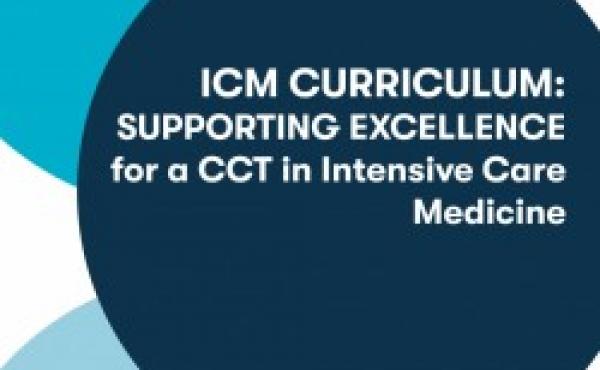Support for ICM StRs
Doctors in training can encounter either personal or professional problems that may affect their performance. With the introduction of personal development plans, appraisal, annual assessment, learning agreements and clinical governance, trainees who struggle to achieve their goals within the expected timescale can be more easily identified and may require support during their career. Whatever the reason for difficulty it should be identified as early as possible. If the problems identified are related to attitudes and behaviours, the use of non-technical skills assessment and targeted training may be required.
Guidance for ICM trainees who have not passed the FFICM examinations is available on the Examinations pages of the FICM website. Any difficulties should feed into the appraisal process, via the Educational Supervisor’s Structured Report and the MSF. Intensive Care Medicine doctors-in-training should be aware that the outcome of meetings with their clinical and educational supervisors will, with their knowledge, help inform the assessment process and therefore the ARCP panel; such discussions should be recorded. If local trainers are unable to remedy the situation, the ARCP panel must be made aware, via the Educational Supervisor’s Structured Report, so that directed learning objectives can then be set. Help might involve a combination of extra supervision, counselling, or focused training. Those involved in the review should take account of any relevant external factors which may have affected progress in training. For those not progressing as expected, additional help and support must be given to enable them to fulfil the requirements of the programme.
Deaneries/NIMDTA will have a clear strategy for dealing with such situations encompassing the spectrum of performance difficulties. Depending on the level of risk, the Educational Supervisor will require a variable degree of support. It is highly recommended that all those involved in the education and clinical supervision of trainees are aware of their local strategy to ensure appropriate support can be provided to the trainee and that patient safety is maintained. In situations where trainees appeal against assessment or other decisions, and informal resolution is not possible, then the process described in the Gold Guide will be followed.
Should you experience any difficulties during your training there are several avenues you can take:
- Speak to your Educational Supervisor at the earliest opportunity
- If further support is required then you can raise any issues with your Faculty Tutor and ICM Regional Advisor
- You can also raise any issues with your designated StR rep on the FICM StR Subcommittee or your regional STC Trainee Representative
- If you would prefer to remain anonymous, you can email contact@ficm.ac.uk stating this fact and ask for any problem to be discussed at the StR Subcommittee. If they feel it is appropriate they will then escalate it to FICM's Training, Assessment and Quality Committee to address.
- If all these avenues have failed to address your concern/issues effectively you can escalate it to our National StR Sub-Committee it via our Reporting Tool.
The Multisource Feedback (MSF) Process
The MSF tool is predominantly formative but does significantly inform the summative decisions that the Educational Supervisor and ARCP panels will be required to make each year regarding progression. The summative aspect relates to how the overall performance of the trainee (satisfactory or unsatisfactory) is viewed by the whole of the MSF process, and whether it has been conducted in accordance with guidance on numbers and suitable respondents. Each assessor will be asked to mark the components of the MSF as being satisfactorily met or otherwise. The tool reflects the importance of adequate communication and teamworking skills within the clinical environment for patient safety.
If performance is unsatisfactory, the trainee can discuss areas for improvement and repeat the assessment but progression to the next stage of training is unlikely to be judged permissible by the Educational Supervisor and ARCP panel until adequate performance has been demonstrated utilising the MSF assessment. The MSF adds value compared to judgements in these areas by clinicians only; different team members provide a different perspective on professional practice. Furthermore, the MSF is the only assessment in the workplace that is predictive of doctors in difficulty and so a trainee encountering difficulty with this assessment should highlight to the ES that further attention is required in training and a shared action plan can then be agreed.
Professional support for postgraduate medical trainees
NHS Health Education England (HEE), Northern Ireland Medical and Dental Training Agency, (NIMDTA), NHS Education for Scotland (NES) and Health Education and Improvement Wales (HEIW) are committed to enabling all postgraduate medical and dental trainees to maximise the opportunities available to them throughout their training.
Professional support resources, usually coordinated through a Professional Support Unit (PSU) or Professional Support and Wellbeing Unit (PSWU) cover all four nations of the UK.
To view the available services in your country please see the following links:
- England: https://www.hee.nhs.uk/our-work/professional-support-postgraduate-medical-dental-trainees
- Northern Ireland: https://www.nimdta.gov.uk/professional-support-wellbeing/
- Scotland: https://www.scotlanddeanery.nhs.scot/trainee-information/support-for-trainees/
- Wales: https://heiw.nhs.wales/support/professional-support-unit/
How to support successful training for black, and minority ethnic doctors
The GMC conducted a qualitative exploration of the factors associated with an absence of an ethnic attainment gap in post-graduate specialty training. This report was published on 04 February 2020.
What were the key findings?
- Black, Asian and minority ethnic (BAME) doctors identify ten key factors which they felt gave them the opportunity to succeed in post graduate training.
- Psychological theory is used to explain why these are important for learning.
- Broader DA literature identifies why BAME trainees are systematically less able to benefit from these kinds of support.
- Practical examples from stakeholders and trainees illustrate how interventions can improve outcomes.
This research study was designed to explore factors associated with specialties and/or training programmes which do not demonstrate statistical variation in attainment of UK-graduated BAME trainees compared to UK-graduated White trainees.
Read the full report here: What supported your success in training? Full report



